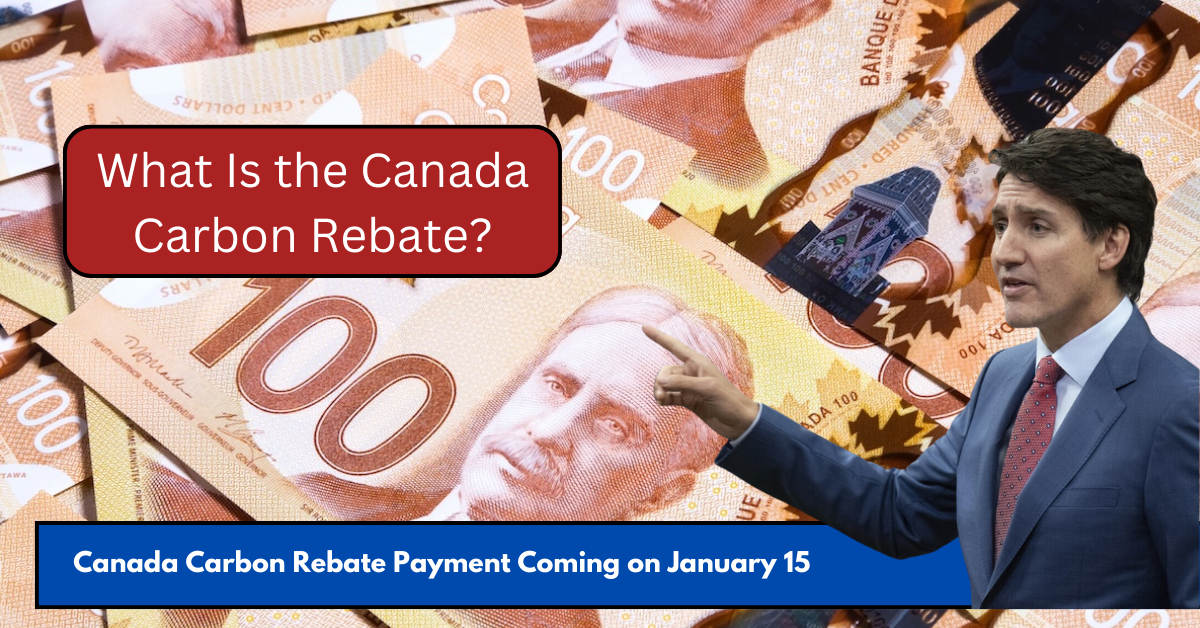The start of the new year brings good news for Canadians, with the first Canada Carbon Rebate payment of 2025 scheduled to arrive today, January 15. This quarterly rebate, managed by the Canada Revenue Agency (CRA), aims to help households cope with the cost of federal pollution pricing while encouraging a shift towards a greener future.
If you’re eligible, you might see this payment directly deposited into your bank account soon. Let’s break down everything you need to know about the Canada Carbon Rebate, including eligibility requirements, payment amounts, and key dates.
What Is the Canada Carbon Rebate?
The Canada Carbon Rebate, formerly known as the Climate Action Incentive Payment (CAIP), is a tax-free benefit paid out quarterly to offset the federal carbon pricing system’s financial impact. It’s part of Canada’s broader strategy to tackle climate change while ensuring families aren’t disproportionately burdened by rising energy costs.
The rebate includes a base payment for all eligible residents and an extra 20% rural supplement for those living in smaller or rural communities to acknowledge their typically higher energy expenses.
Who Qualifies for the Rebate?
To qualify for the Canada Carbon Rebate, you must meet the following conditions:
- Residency in a Participating Province: Eligible provinces include Alberta, Manitoba, New Brunswick, Newfoundland and Labrador, Nova Scotia, Ontario, Prince Edward Island (P.E.I.), and Saskatchewan. Residents of British Columbia, Quebec, and the territories are excluded as these regions have their own carbon pricing systems.
- Age Requirement: You must be at least 19 years old unless you’re:
- Married or in a common-law relationship.
- A parent living with your child.
- Additional Payments for Children: Parents receive extra payments for each eligible child registered under the Canada Child Benefit (CCB) or GST/HST credit programs.
- Income-Independent: Eligibility does not depend on your income level; all qualifying residents receive the same amount.
How to Receive the Rebate
No separate application is required for the Canada Carbon Rebate. However, filing your taxes is essential:
- File Your Taxes: Even if you have no income, file your annual tax return as the CRA uses this to determine eligibility and payment amounts.
- For Married Couples or Common-Law Partners: The payment is issued to the partner who files their tax return first.
- Newcomers to Canada: You need to submit specific forms, such as the Canada Child Benefits Application (RC66 and RC66SCH) for families or the GST/HST Credit and Canada Carbon Rebate Application (RC151) for individuals.
- Claiming the Rural Supplement: Check the designated box on page 2 of your tax return if your primary residence is outside a Census Metropolitan Area (CMA).
How Much Will You Receive?
The payment amount varies by province and family situation. Below is a breakdown of the quarterly base amounts for January 2025:
- Alberta: $225 (individual), $112.50 (spouse/first child), $56.25 (additional child).
- Manitoba: $150 (individual), $75 (spouse/first child), $37.50 (additional child).
- New Brunswick: $95 (individual), $47.50 (spouse/first child), $23.75 (additional child).
- Newfoundland and Labrador: $149 (individual), $74.50 (spouse/first child), $37.25 (additional child).
- Nova Scotia: $103 (individual), $51.50 (spouse/first child), $25.75 (additional child).
- Ontario: $140 (individual), $70 (spouse/first child), $35 (additional child).
- Prince Edward Island: $110 (individual), $55 (spouse/first child), $27.50 (additional child).
- Note: All P.E.I. residents automatically qualify for the rural supplement.
- Saskatchewan: $188 (individual), $94 (spouse/first child), $47 (additional child).
Rural Supplement Example: Residents of rural areas receive an extra 20%. For instance, an individual in Alberta’s rural areas would receive $270 instead of $225.
Important Payment Dates for 2025
This year’s payments are scheduled quarterly, typically reaching bank accounts within a few days of these dates:
- January 15
- April 15
- July 15
- October 15
Key Updates for 2025
Starting in April 2025, eligibility for the rural supplement will expand to include additional Census Rural Areas and small population centers within Census Metropolitan Areas (CMAs). This change could benefit an estimated 1.6 million Canadians. Communities such as Caledon and Amherstburg in Ontario and Fort Saskatchewan in Alberta are among the areas expected to qualify.
Is the Rebate Taxable?
No, the Canada Carbon Rebate is entirely tax-free. You do not need to report it on your annual tax return.
The Canada Carbon Rebate represents a small but meaningful way to help Canadians manage rising costs while contributing to the fight against climate change. Ensure you’ve filed your taxes to take full advantage of this financial benefit.
This article has been carefully fact-checked by our editorial team to ensure accuracy and eliminate any misleading information. We are committed to maintaining the highest standards of integrity in our content.
Premlata is a seasoned finance writer with a keen eye for unraveling complex global financial systems. From government benefits to energy rebates and recruitment trends, she empowers readers with actionable insights and clarity. When she’s not crafting impactful articles, you can find her sharing her expertise on LinkedIn or connecting via email at biswaspremlata@gmail.com.
